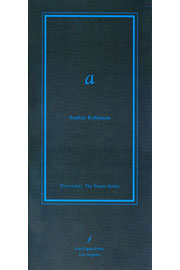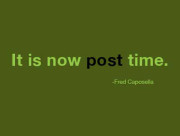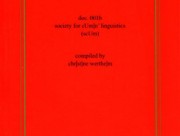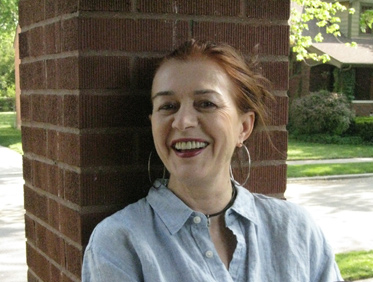+|'me'S-pace
Christine Wertheim
Introduction by Dodie Bellamy
Cover art by Lisa Darms
Book 4 of 5, TrenchArt Casements Series
Litteral Poetics | $15.00
ISBN: 978-0-9766371-9-6
Size: 9.25″ X 4.25″
Pages: 112
Binding: Softcover, Perfect
BUY NOW at LARB BOOKS
+|‘me’S-pace, doc. 001.b is a poetic enquiry into the current state of the English tongue, and is book 1, volume 2 of a wider project known as “For Love Alone” Christina’S-tead.
In making its investigations, the project employs a method known as litteral poetics, in which words are not taken as arbitrary signs the writer may use as s/he sees fit, but as compounds with substance and structures and, literally, meanings‚ of their own. The method begins by isolating arrangements of the tongue that seem most categorical, proceeds to investigating the combinations and permutations within these strings, and finishes by presenting noteworthy arrangements to the reader’s e|e and ear
+|‘me’S-pace is published as part of the TrenchArt: Casements Series, with and Introduction by Dodie Bellamy and visual art by Lisa Darms.
Praise for +|’me’S-pace
“Written in a time when many are questioning if we still need formalism and feminism, Christine Werthiem’s +|’me’S-pace, doc. 001.b is a spirited and fun defense of both. Written, in part, as a didactic instructional manual that cannot keep itself from constantly going astray into beautiful and challenging language play, this is a book that asks crucial questions and reconfigures recent histories. It is essential for its arguments.”
-Juliana Spahr
“+|’me’S-pace begins with a simple proposition: select 9 letters of the English language (6 consonants, 3 vowels); arrange into words; and then, for enhanced flexibility, add an apostrophe. But nothing is as simple as it seems. Wertheim’s manipulation of these characters flows in a certain direction, so that particular words assert themselves, recurring. Other, mother, me, another, not other—language ends up where we want it to be. As William S. Burroughs once remarked on the cut-up method of text composition, “Random? Yes—but it’s my random.” Certain wills will out. (Language it seems is a matter of will, and the unconscious is not so inchoate. What happens, asks Wertheim, when language shifts from the impersonal to the personal mode? How do we ever do anything? These linguistic experiments yield results sometimes reminiscent of Ezra Pound’s forays into Old English within the Cantos. | Me is “wruptin‚ the space between” herself and another until the “I” erases itself, becomes love, becomes nothing. +|’me’S-pace is an ambitious project, disclosing the spiral of language and being.”
-Chris Kraus
“Litteral poetics does not deal with Language or universal theories of meaning, formal or otherwise. It is neither a general system designed to analyze others, nor a calculating tool to help us perform life better, faster, kill, kill, kill.”
-Jerome Rothenberg
Read Rothenberg’s in-depth discussion of litteral poetics








